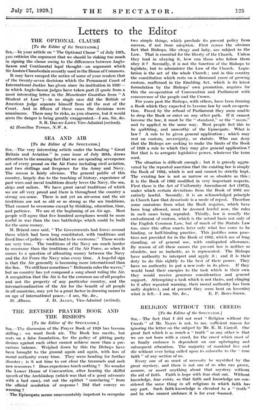THE REVISED PRAYER BOOK AND THE BISHOPS
[To the Editor of the SPECTATOR.] Sur,—The discussion of the Prayer Book of 1928 has become stifling we want fresh air. The Book has merits, but rests on a false foundation, for the policy of pitting party desires against each other cannot achieve more than a -pre- carious balance. Weighed down by this the Bishops have been brought to the ground again and again, with loss of moral authority every time. They seem heading for further disaster ; is it not time to cut clear the trammels- and seek new resources ? Does experience teach nothing ? No wonder the Lower House of Convocation, after hearing the skilful speech of the Archbishop (which was that of a good advocate with a bad case), out out the epithet " convincing " from the official resolution of response ! Did that convey no warning ?
The Episcopate seems unaccountably impotent to recognize two simple things, which preclude its present policy from success, if not from adoption. First comes the obvious fact that Bishops, like clergy and laity, are subject to the Law. That is essential for the liberty of the Church. Unless they lead in obeying it, how can those who follow them obey it ? Secondly, it is not the function of the Bishops to legislate, but to administer the Law of the Church. Legis- lation is the act of the whole Church ; and in this country the constitution which rests on a thousand years of growing custom, reaffirmed in the Enabling Act, which is its latest formulation by the Bishops' own promotion, requires for this the co-operation of Convocation and Parliament with concurrence of the people and the Crown.
For years past the Bishops, with others, have been framing a Book which they expected to become law by such co-opera- tion. Faced by the refusal of Parliament they seem unable to drop the Book or enter on any other path. If it cannot become the law, it must be the " standard," or the " norm," and be applied in the same way. Most people feel this to be quibbling, and unworthy of the Episcopate. What is law ? A rule to be given general application ; which may rest on custom, sovereignty, or statute. Who can deny that the Bishops are seeking to make the limits of the Book of 1928 a rule to which they may give general application ? But that is to arrogate legislative power, whatever the term used.
The situation is difficult enough ; but it is gravely aggra- vated by the repeated assertion that the existing law is simply the Book of 1662, which is not and cannot be strictly kept. The existing law is not so narrow or so obsolete as this : it is the Book of 1662 modified in very important respects. First there is the Act of Uniformity Amendment Act (1872), under which certain deviations from the Book of 1662 are entirely lawful. Secondly, it is an acknowledged principle in Church Law that desuetude is a mode of repeal. Therefore some omissions from what the Book requires, which have been long allowed, must be deemed lawful now, the rules in such cases being repealed. Thirdly, law is usually the embodiment of custom, which is the actual basis not only of the English Common Law, but of much of the Statute Law too, since this often enacts later only what has come to be binding, or half-binding practice. This justifies some prac- tices not provided for in the Book of 1662, which are of long standing, or of general use, with undisputed allowance. By reason of all these causes the present law is neither so obsolete, nor so inelastic, as is represented. The Bishops have authority to interpret and apply it ; and it is their duty to do this rightly to the best of their power. They have no authority to put a new code in its place. If they would bend their energies to the task which is their own they would receive generous consideration and general support. Attempting a task which is not theirs, and clinging to it after repeated warning, their moral authority has been sadly depletel, and at present they seem bent on lessening what is left.—I am, Sir, &e., E. P. BOys-SMITIL


































 Previous page
Previous page